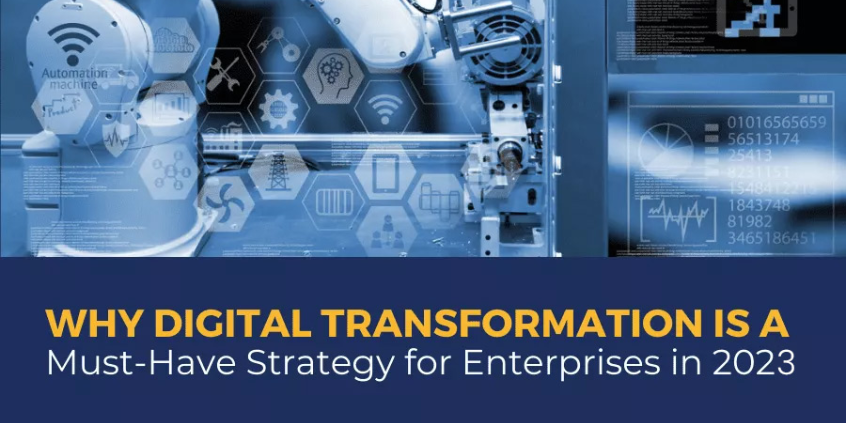Digital transformation solutions play a crucial role in leading modern enterprises toward success. But then, as more entrepreneurs tend to jump on the digitization bandwagon globally, it is of utmost importance that a well-planned digital transformation strategy should be in place. In this article, we are going to discuss five major ways to implement enterprise digital transformation effectively.
In a recent survey conducted by SAP and Oxford Economics, 80% of leading enterprises mentioned that digital transformation can increase profitability. However, factors like ‘fear of the unknown’, ‘lack of discipline’, and work culture-related issues can derail digital transformation efforts. Here we give five proven practices to help you implement digital transformation solutions successfully while overcoming these issues.
Five Key Aspects of Effective Digital Transformation Strategy
1. Define
Lack of direction and focus are the biggest hurdles in the way of digital transformation. Therefore, it is necessary to define the right digital transformation strategy in a way that every stakeholder can understand. Also, you should assess whether the digital transformation is feasible in line with the core objectives, budgetary limitations, and type of your business model.
When you define a roadmap for digital transformation, it is better to take the help of a reputed digital transformation consultant. You can ensure maximum ROI from digital transformation solutions with the help of such a consultant.
2. Communicate
Another essential step is proper communication. After defining a roadmap, you can start an effort to make everyone understand the new direction. Every employee and stakeholder should get the necessary details about the strategy and its impact at every level. Here, effective communication plays a vital role and assists employees to act accordingly.
Digital transformation is not only a technological change, it brings radical changes in the company’s culture as well. There, effective and real-time communication can certainly assist your enterprise to make this transition as smooth as possible. On one hand, effective communication can assist you to get rid of issues related to the lack of understanding, and on the other hand, it can make your staff ready for a transformation.
Also Read- How to Ensure Digital Transformation Success for Your Enterprise
3. Implement
Before implementing digital transformation in your enterprise, it is essential to relate the strategic structures to your business model. It enables you to assess the impact and possible outcome of the transformational change. Successful digital transformation requires a combination of top-down and bottom-up approaches in a collaborative environment.
It is beneficial for enterprises to provide a context, scope, and set of limitations to various teams for effective implementation. Teams can coordinate their efforts and avoid unnecessary duplication of work while preventing the instance of agile silos. It can significantly increase the chances of effective implementation.
4. Stimulate
Digital innovation can be a game-changer in ensuring the success of digital transformation solutions. Contrary to that, in many organizations, local teams find it difficult to improve their ways of working innovatively. Even though all the employees working on the shop floor know what should be improved, they fail to bring innovative solutions because of the lack of insights and technical skills.
As an entrepreneur, you can stimulate innovation and improvement locally while supporting learning. Even if your employees are not authorized to bring changes, you can simply get their feedback and implement them in the form of bespoke digital transformation solutions.
5. Compliant
This is one of the most crucial aspects to consider while implementing a digital transformation strategy. While integrating digital transformation solutions into the business model, enterprises have to deal with prevalent regulations and other compliance-related requirements. Such regulatory pressure can be from internal and external sources. It can be either industry-specific or generic, and you cannot avoid this pressure.
An integrated approach can assist your enterprise to remain compliant with all standards and regulations. A digital solutions provider can assess and analyze business processes, decision logic, data models, and regulatory standards.
While following these practices, it is necessary to manage risks associated with the enterprise digital transformation. It is fair to mention that while implementing digital transformation solutions, you need to rebuild your workplace and upgrade the ongoing processes while improving the ways of communication. Enterprise digital transformation is an ongoing process and changes need to be made frequently in the solution to keep it relevant.
Concluding Lines
Every enterprise needs a different digital transformation strategy based on its key objectives, business model, and other factors. Hope these five ways will assist you to make the most of digital transformation solutions in a cost-effective way. Proper implementation of these ways will ensure growth and assist your enterprise to stay ahead of the curve.
Rejig Digital is a leading digital transformation solutions provider. Our customized remote assistance and asset monitoring solutions are designed to meet the complex business requirements of various industry sectors. Feel free to send us an email at info@rejigdigital.com to get an effective digital transformation strategy for your enterprise.





